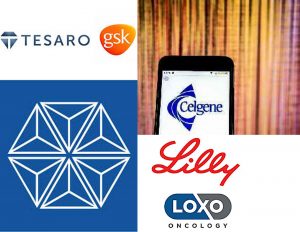 Each January, a large portion of the international healthcare industry descends on San Francisco for the JP Morgan Healthcare Conference and a variety of other concurrent industry events. The sentiment of the nearly 10,000 attendees — largely influenced by partnering news and big merger/acquisition deals announced around these events — typically sets the tone for business and investment in the months to come.
Each January, a large portion of the international healthcare industry descends on San Francisco for the JP Morgan Healthcare Conference and a variety of other concurrent industry events. The sentiment of the nearly 10,000 attendees — largely influenced by partnering news and big merger/acquisition deals announced around these events — typically sets the tone for business and investment in the months to come.
If JP Morgan Week is indeed a harbinger of things to come in 2019, this will be a big year for companies in the oncology space. Bristol-Myers Squibb (BMS) announced the $74 billion acquisition of Celgene, quickly followed by the news that Eli Lilly would buy Loxo Oncology for $8 billion. But in fact, the series of big oncology acquisitions got its start in early December, when Glaxo SmithKline (GSK) announced plans to buy Tesaro for $4.2 billion. In each case, the big pharma acquirer gains oncology capabilities and/or a market presence in a hot area of cancer drug development and treatment.
In the case of BMS, the Celgene acquisition diversifies BMS’s oncology portfolio and gives the company a promising CAR-T product, originally acquired by Celgene through its purchase of Juno in early 2018. When the deal is closed, the combined company will have nine marketed drugs and another six in a late-stage of development: four in the area of hematology, including the CAR-T treatment liso-cel, and another two product candidates in the area of immunology and inflammation. Until now, BMS’s future in oncology had been largely associated with Opdivo, which experienced several trial failures in recent years. Some industry watchers are regretting the anticipated disappearance of Celgene, however, which had been very active in partnering with other companies in recent years.
Lilly’s buyout of Loxo, a company focused on developing oncology drugs based on specific tumor biomarkers rather than their tissue of origin, gives the big pharma company additional targeted therapy capabilities as well as knowledge of unique cancer biomarkers for potential use in companion diagnostics. Loxo/Bayer’s Vitrakvi was approved by the U.S. Food and Drug Administration (FDA) in November for the treatment of patients with solid tumors harboring a NTRK gene fusion, and their Loxo-292 asset, which targets patients with a RET gene mutation, has shown promising results in late-stage clinical trials for non-small cell lung cancer and thyroid cancer.
Similarly, GSK’s purchase of Tesaro gives the big pharma new capabilities in in the very competitive PARP inhibitor space thanks to Tesaro’s promising therapy Zejula, which may have applications not only in ovarian cancer but potentially lung, breast, and prostate tumors.
We’re eager to see who will be next, whether other big pharma companies will follow suit and expand their oncology portfolio through acquisitions, and what will happen in the deal space to smaller oncology companies, now that Celgene will no longer be an active deal-maker.